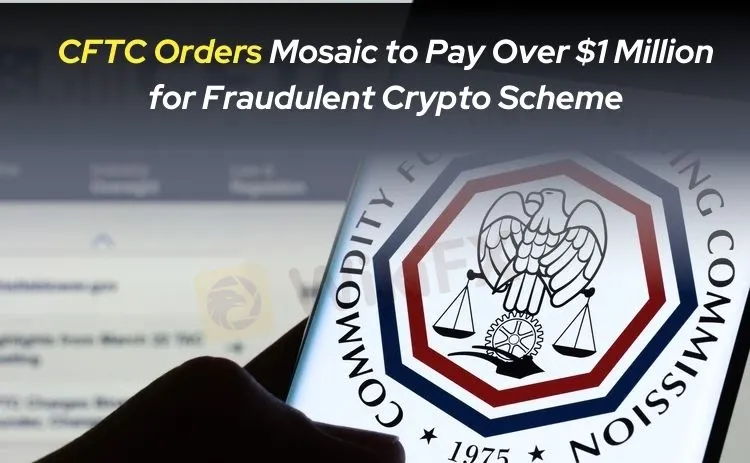简体中文
繁體中文
English
Pусский
日本語
ภาษาไทย
Tiếng Việt
Bahasa Indonesia
Español
हिन्दी
Filippiiniläinen
Français
Deutsch
Português
Türkçe
한국어
العربية
CFTC Orders Mosaic to Pay Over $1 Million for Fraudulent Crypto Scheme
Abstract:The U.S. Commodity Futures Trading Commission (CFTC) has recently filed a significant lawsuit against Mosaic Exchange Limited and its CEO, Sean Michael, alleging a fraudulent digital asset commodity scheme that occurred between February 2019 and June 2021.

According to the CFTC‘s allegations, Mosaic Exchange and Michael falsely claimed to at least 17 investors from the U.S. and other countries that the platform managed tens of millions of dollars in assets and operated a proprietary trading algorithm with an accuracy rate of 82%, delivering monthly profits between 10% and 60%. They also claimed partnerships with well-known cryptocurrency exchanges like BitMEX and Binance. However, the CFTC’s investigation revealed that these claims were fabricated, designed to entice investors into entrusting their Bitcoin and other assets for trading purposes.
The CFTC further noted that Mosaic Exchange failed to achieve the promised profitability and, instead, suffered losses while trading on behalf of its clients. Additionally, Michael misappropriated client funds for personal expenses, including dining and travel, rather than using them for the pledged trading activities. This resulted in substantial financial losses for numerous investors.

The CFTC has filed the lawsuit in the U.S. District Court for the Southern District of Florida, charging Mosaic Exchange and Michael with violations of the Commodity Exchange Act (CEA) and related CFTC regulations. The CFTC seeks restitution for victims, disgorgement of ill-gotten gains, civil monetary penalties, and a permanent ban on the defendants from trading or registering in any CFTC-regulated markets.
In a statement, CFTC Commissioner Kristin N. Johnson emphasized that such fraudulent schemes pose significant risks to investors, especially in the digital asset sector. She called for enhanced investor protection measures to combat Bitcoin fund fraud and safeguard market integrity.
This case serves as a stark reminder for investors to exercise caution when engaging in digital asset investments. Faced with promises of high returns and unverified trading platforms, investors are urged to conduct thorough due diligence and choose regulated financial institutions to avoid falling victim to similar fraudulent schemes.
Disclaimer:
The views in this article only represent the author's personal views, and do not constitute investment advice on this platform. This platform does not guarantee the accuracy, completeness and timeliness of the information in the article, and will not be liable for any loss caused by the use of or reliance on the information in the article.
Read more

Anti-Scam Groups Urge Tougher Action on Fraudsters in UK
Anti-scam groups demand tougher police action on fraudsters as UK fraud rates surge 19%, targeting millions in a penalty-free crime spree exposed by a $35m scam leak.

Philippines Deports 29 Indonesians Linked to Online Scam Syndicate in Manila
Online scam groups in the Philippines trick Filipinos into gambling and love scams, from Manila to Bacolod, causing trafficking and pain as police fight back.

Lost Money to Scam Recently?! This Article Could Help You!
The rise of online trading has brought unparalleled opportunities for investors worldwide. However, alongside legitimate platforms, fraudulent brokers continue to exploit unsuspecting individuals, luring them with promises of high returns and exclusive investment opportunities. For those who have fallen victim to such schemes, the pressing concern remains: is there a path to recovering lost funds?

Fake Website Forex Scam, Arrests Two for Duping 100+ Investors
Chennai Cyber Crime exposes forex trading scam, arrests two men for cheating 100+ investors via fake websites. Beware of fraudulent investment schemes.
WikiFX Broker
Latest News
How Crypto Trading Transforms FX and CFD Brokerage Industry
UK would not hesitate to retaliate against US tariffs - No 10 sources
FCA Warns Against 10 Unlicensed or Clone Firms
CySEC Warns Against 14 Unlicensed Investment Websites
Top Currency Pairs to Watch for Profit This Week - March 31, 2025
Will natural disasters have an impact on the forex market?
Philippines Deports 29 Indonesians Linked to Online Scam Syndicate in Manila
Navigating the Intersection of Forex Markets, AI Technology, and Fintech
Exposed: Deceptive World of Fake Trading Gurus – Don’t Get Fooled!
AI-Powered Strategies to Improve Profits in Forex Trading
Currency Calculator







